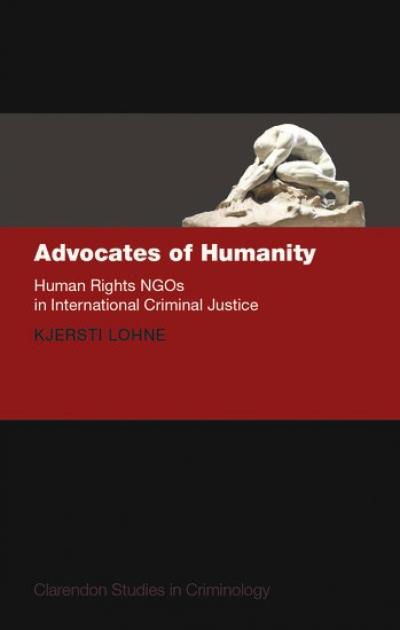All Souls Blog: "Advocates of Humanity: Human Rights NGOs in International Criminal Justice" — Criminal punishment gone global
Dr Kjersti Lohne is a postdoctoral researcher at the Department of Criminology and Sociology of Law, at the University of Oslo. Her research interests syndicate criminology with critical international law and international relations. In particular, she is invested in the role and legitimacy of international penal power. Lohne’s extensive work has been published in several journals including Theoretical Criminology, Punishment and Society, Law and Society Review, Millennium: Journal of International Studies, and Surveillance and Society. In 2014 Lohne was a visiting researcher at the Centre for Criminology at Oxford University. In 2019 she was awarded the European Society of Criminology Young Scholar Award. The All Souls Seminar focused on her recently released book, ‘Advocates of Humanity: Human Rights NGOs in International Criminal Justice’, situating it in wider works regarding critical international law.
Posted:
Time to read:
Paradoxes of NGOs in International Criminal Justice
During her presentation, Dr Lohne described the so-called ‘Advocates of Humanity’ as a profound means of analysing international criminal justice through the theoretical lens of a sociology of punishment. She meticulously investigates the nature of human rights organisations, specifically in their mobilisation for global justice through the International Criminal Court (ICC). By building on multi-sited ethnography – especially cases in The Hague and Uganda – she approaches the transnational networks of NGOs advocating for the ICC as an ethnographic entity. A pivotal perspective regarding her work is to investigate and explore how connections are constructed, and how far forces and imaginations of global criminal justice move on a local as well as global scale. This is done by analysing how international criminal justice is organised spatially, and as such expresses social, political, and cultural relations of power. From a sociology of punishment perspective, she compares the 'penal imaginations' of domestic and international criminal justice and reflects the central role of victims as a universalised symbol of humanity for the legitimacy of international criminal justice.

Networks for Global Justice-making
Dr Lohne’s presentation focussed on the engagement of her most recent book into multifaceted issues. The author directed her attention to a sociologist perspective of how international penalty can be understood as being part of broader societal structures. Lohne created an approach that is not utilising the rather traditional political science approach on law which, however, dominates recent discussions in academic literature. Her approach enables her to investigate the complex interplay of justice institutions through the means of sociological dimension such as class and their respective sensing. Specifically, the author is examining international human rights NGOs which she calls ‘Advocates of Humanity’. In her view, these players are crucially important for building and developing the understanding of how one views issues such as punishment by acting as the moral authority.
Spaces and Places of International Criminal Justice
Dr Lohne conceptualises the so-called ‘global’ by referring to crucial disparities alongside the North and South division. In her understanding, the local sites – in which crimes have been committed – oftentimes are situated far away from the area from where justice is provided. Referring to an example, she offers further insights into her perspective by delivering a case study on the Hague and Uganda respectively. In the African country, she argues, justice remains elusive and is generated ‘behind closed doors’.
Global Moral Entrepreneurs
The argument is further established by deciphering the divide alongside the North and the South. NGO networks are – according to Lohne – intermediaries that enable the exchange and connectivity between the so-called ‘local’ and ‘global’ in a supranational sphere of politics. Hence, she argues that NGO networks, from a broader perspective, claim moral authority as well as power by imposing universality of human values as well as expertise in legal issues. By investigating both private as well as professional interests of NGO networks, she confirms this impression. Furthermore, her recent argument encounters the apparent neutrality these networks proclaim to have. Ultimately, Lohne is able to categorise human rights NGOs and their respective networks as ‘global moral entrepreneurs’ or ‘advocates of humanity’. This is done by taking into consideration that an absence of representation may lead to discrepancy across geographical arenas.
From Criminal to Victim’s Justice
To empirically verify her understanding of NGO networks, she conducts an analysis of how victims are perceived in the global North. In this geographic sphere, a victim is seen as a symbol of suffering within the sociological dimension of gender as well as race. This conceptualisation of a victim becomes vague by taking rather distant places – especially in the global South – into consideration. The author presents an interesting argument by providing a new perspective on what this image of a victim exemplifies. She argues that this image underlines the humanity which morally legitimises criminal justice institution. Thus, the victim becomes a ‘currency for moral authority of the ‘Advocates of humanity’. Finally, Lohne argues for a shift in the punishing authority away from the ICC’s currently existing privilege of a global dominance in legal authority.
At the end of her talk Lohne opened up the discussion question in regard to what can actually be done in order to remedy the power inequalities embedded in the field of international criminal justice and by whom this could and should be done. Overall, her lecture and the respective book, represent a valuable insight into the academic literature. By the means of her experience as well as practical knowledge, Lohne is able to grasp the issue at hand both theoretically as well as practically. Moreover, she provides innovative as well as concrete solutions discussed in the lecture. Outlining a sociological perspective Lohne argues convincingly for increasing cooperation between crucial stakeholders within the field of international criminal justice.


Keywords:
Share:
